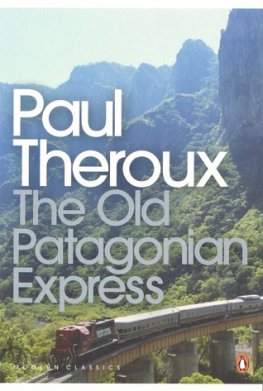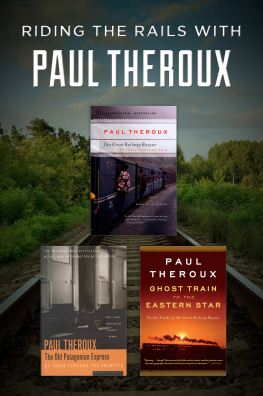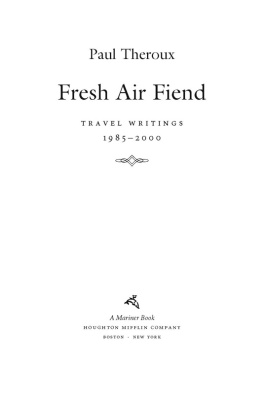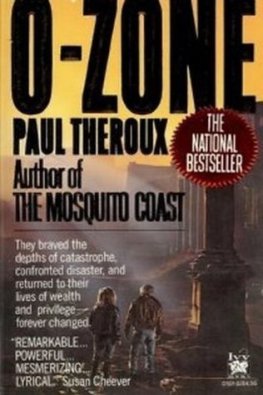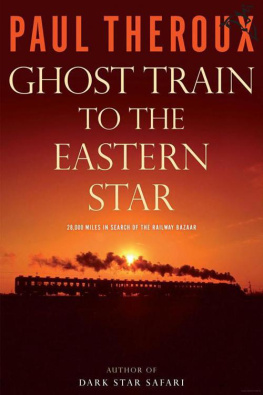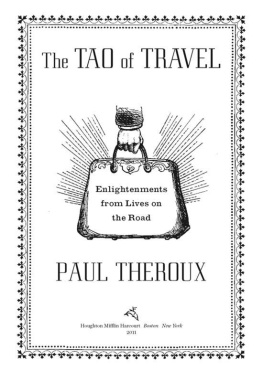Paul Theroux - The Old Patagonian Express: By Train Through the Americas
Here you can read online Paul Theroux - The Old Patagonian Express: By Train Through the Americas full text of the book (entire story) in english for free. Download pdf and epub, get meaning, cover and reviews about this ebook. year: 2008, publisher: Penguin Books Ltd, genre: Adventure. Description of the work, (preface) as well as reviews are available. Best literature library LitArk.com created for fans of good reading and offers a wide selection of genres:
Romance novel
Science fiction
Adventure
Detective
Science
History
Home and family
Prose
Art
Politics
Computer
Non-fiction
Religion
Business
Children
Humor
Choose a favorite category and find really read worthwhile books. Enjoy immersion in the world of imagination, feel the emotions of the characters or learn something new for yourself, make an fascinating discovery.
- Book:The Old Patagonian Express: By Train Through the Americas
- Author:
- Publisher:Penguin Books Ltd
- Genre:
- Year:2008
- Rating:4 / 5
- Favourites:Add to favourites
- Your mark:
- 80
- 1
- 2
- 3
- 4
- 5
The Old Patagonian Express: By Train Through the Americas: summary, description and annotation
We offer to read an annotation, description, summary or preface (depends on what the author of the book "The Old Patagonian Express: By Train Through the Americas" wrote himself). If you haven't found the necessary information about the book — write in the comments, we will try to find it.
The Old Patagonian Express: By Train Through the Americas — read online for free the complete book (whole text) full work
Below is the text of the book, divided by pages. System saving the place of the last page read, allows you to conveniently read the book "The Old Patagonian Express: By Train Through the Americas" online for free, without having to search again every time where you left off. Put a bookmark, and you can go to the page where you finished reading at any time.
Font size:
Interval:
Bookmark:
Paul Theroux
The Old Patagonian Express: By Train Through the Americas
That train was the one piece of life in all the deadly land; it was the one actor, the one spectacle fit to be observed in this paralysis of man and nature. And when I think how the railroad has been pushed through this unwatered wilderness and haunt of savage tribes. . how at each stage of the construction, roaring, impromptu cities, full of gold and lust and death, sprang up and then died away again, and are now but wayside stations in the desert; how in these uncouth places pig-tailed Chinese pirates worked side by side with border ruffians and broken men from Europe, talking together in a mixed dialect, mostly oaths, gambling, drinking, quarrelling and murdering like wolves; how the plumed hereditary lord of all America heard, in this last fastness, the scream of the 'bad medicine waggon' charioting his foes; and then when I go on to remember that all this epical turmoil was conducted by gentlemen in frock-coats, and with a view to nothing more extraordinary than a fortune and a subsequent visit to Paris, it seems to me, I own, as if this railway were the one typical achievement of the age in which we live, as if it brought together into one plot all the ends of the world and all the degrees of social rank, and offered to some great writer the busiest, the most extended, and the most varied subject for an enduring literary work. If it be romance, if it be contrast, if it be heroism that we require, what was Troy town to this?
Robert Louis Stevenson, The Amateur Emigrant'Romance!' the season-tickets mourn,
'He never ran to catch his train,
'But passed with coach and guard and horn -
'And left the local late again!'
Confound Romance. . And all unseen
Romance brought up the nine-fifteen.
Rudyard Kipling, 'The King'For my Shanghai Lil, and for Anne, Marcel, and Louis, with love
1 THE LAKE SHORE LIMITED
One of us on that sliding subway train was clearly not heading for work. You would have known it immediately by the size of his bag. And you can always tell a fugitive by his vagrant expression of smugness; he seems to have a secret in his mouth he looks as if he is about to blow a bubble. But why be coy? I had woken in my old bedroom, in the house where I had spent the best part of my life. The snow lay deep around the house, and there were frozen footprints across the yard to the garbage can. A blizzard had just visited, another was expected to blow in soon. I had dressed and tied my shoes with more than usual care, and left the stubble on my upper lip for a moustache I planned to grow. Slapping my pockets to make sure my ballpoint and passport were safe, I went downstairs, past my mother's hiccupping cuckoo clock, and then to Wellington Circle to catch the train. It was a morning of paralyzing frost, the perfect day to leave for South America.
For some, this was the train to Sullivan Square, or Milk Street, or at the very most Orient Heights; for me, it was the train to Patagonia. Two men using a foreign language spoke in low voices; there were others with lunch-boxes and valises and briefcases, and one lady with the sort of wrinkled department store bag that indicated she was going to return or exchange an unwanted item (the original bag lending veracity to the awkward operation). The freezing weather had altered the faces in the multi-racial car: the whites' cheeks looked rubbed with pink chalk, the Chinese were bloodless, the blacks ashen or yellow-grey. At dawn it had been 12 Fahrenheit, by mid-morning it was 9, and the temperature was still dropping. The cold wind gusted through the car as the doors opened at Haymarket, and it had the effect of silencing the muttering foreigners. They looked Mediterranean; they winced at the draught. Most of the people sat compactly, with their elbows against their sides and their hands in their laps, squinting and conserving their warmth.
They had affairs to attend to in town work, shopping, banking, the embarrassing moment at the refund desk. Two had hefty textbooks in their laps, and a spine turned towards me read A General Introduction to Sociology. A man solemnly scanned the headlines in the Globe, another thumb-flicked the papers in his briefcase. A lady told her little girl to stop kicking and sit still. Now they were getting out at the windy platforms- after four stations the car was half-full. They would return that evening, having spent the day speaking of the weather. But they were dressed for it, office clothes under eskimo coats, gloves, mittens, woolly hats; resignation was on their faces and, already, a suggestion of fatigue. Not a trace of excitement; all this was usual and ordinary; the train was their daily chore.
No one looked out of the window. They had seen the harbour, and Bunker Hill, and the billboards before. Nor did they look at each other. Their gazes stopped a few inches from their eyes. Though they paid no attention to them, the signs above their heads spoke to these people. These folks were local, they mattered, the advertising men knew who they were addressing. NEED FEDERAL INCOME TAX FORMS? Beneath it, a youth in a pea-jacket grinned at his newspaper and swallowed. CASH YOUR CHECKS ALL OVER MASSACHUSETTS. A lady with that yellow-grey Hottentot colour hugged her shopping bag. BE A SCHOOL VOLUNTEER IN THE BOSTON PUBLIC SCHOOLS. Not a bad idea for the sick-of-it-all briefcase examiner in the Russian hat. MORTGAGE MONEY? WE HAVE PLENTY. No one glanced up. ROOFS AND GUTTERS. GET A COLLEGE DEGREE IN YOUR SPARE TIME. A restaurant. A radio station. A plea to stop smoking.
The signs did not speak to me. These were local matters, but I was leaving this morning. And when you are leaving, the promises in advertisements are ineffectual. Money, school, house, radio: I was putting them behind me, and in the duration of this short trip from Wellington Circle to State Street, the words of the ads had become merely an imploring jabber, like the nonsense of an unknown language. I could shrug; I was being pulled away from home. Apart from the cold, and the blinding light on the fallen snow, there was nothing of great significance in my going, nothing momentous except the fact that as we drew into South Station I was now a mile nearer to Patagonia.
Travel is a vanishing act, a solitary trip down a pinched line of geography to oblivion.
What's become of Waring
Since he gave us all the slip?
But a travel book is the opposite, the loner bouncing back bigger than life to tell the story of his experiment with space. It is the simplest sort of narrative, an explanation which is its own excuse for the gathering up and the going. It is motion given order by its repetition in words.
That sort of disappearance is elemental, but few come back silent. And yet the convention is to telescope travel writing, to start as so many novels do in the middle of things, to beach the reader in a bizarre place without having first guided him there. 'The white ants had made a meal of my hammock,' the book might begin; or, 'Down there, the Patagonian valley deepened to grey rock, wearing its eons' stripes and split by floods.' Or, to choose actual first sentences at random from three books within arm's reach:
'It was towards noon on March 1, 1898, that I first found myself entering the narrow and somewhat dangerous harbour of Mombasa, on the east coast of Africa.' (The Man-Eaters of Tsavo, by Lt Col J.H. Patterson)
' "Welcome!" says the big signboard by the side of the road as the car completes the corkscrew ascent from the heat of the South Indian plains into an almost alarming coolness.' (Duty Preserved, by Mollie Panter-Downes)
'From the balcony of my room I had a panoramic view over Accra, capital of Ghana.' (Which Tribe Do You Belong To? by Alberto Moravia)
Font size:
Interval:
Bookmark:
Similar books «The Old Patagonian Express: By Train Through the Americas»
Look at similar books to The Old Patagonian Express: By Train Through the Americas. We have selected literature similar in name and meaning in the hope of providing readers with more options to find new, interesting, not yet read works.
Discussion, reviews of the book The Old Patagonian Express: By Train Through the Americas and just readers' own opinions. Leave your comments, write what you think about the work, its meaning or the main characters. Specify what exactly you liked and what you didn't like, and why you think so.

